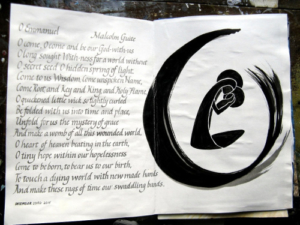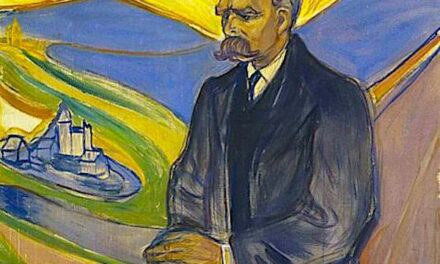We support our Publishers and Content Creators. You can view this story on their website by CLICKING HERE.
 In my Advent Anthology from Canterbury Press Waiting on the Word, we come to the last of the Seven Great O Antiphons, which was sung on either side of the Magnificat on Christmas Eve, O Emmanuel, O God with us. This is the antiphon from which our lovely Advent hymn takes its name. It was also this final antiphon which revealed the secret message embedded subtly into the whole antiphon sequence. In each of these antiphons we have been calling on Him to come to us, to come as Light as Key, as King, as God-with-us. Now, standing on the brink of Christmas Eve, looking back at the illuminated capital letters for each of the seven titles of Christ we would see an answer to our pleas: ERO CRAS, the Latin words meaning “Tomorrow I will come!”
In my Advent Anthology from Canterbury Press Waiting on the Word, we come to the last of the Seven Great O Antiphons, which was sung on either side of the Magnificat on Christmas Eve, O Emmanuel, O God with us. This is the antiphon from which our lovely Advent hymn takes its name. It was also this final antiphon which revealed the secret message embedded subtly into the whole antiphon sequence. In each of these antiphons we have been calling on Him to come to us, to come as Light as Key, as King, as God-with-us. Now, standing on the brink of Christmas Eve, looking back at the illuminated capital letters for each of the seven titles of Christ we would see an answer to our pleas: ERO CRAS, the Latin words meaning “Tomorrow I will come!”
O Emmanuel
O Rex
O Oriens
O Clavis
O Radix
O Adonai
O Sapientia
I have also tried in my final sonnet to look back across the other titles of Christ, but also to look forward, beyond Christmas, to the new birth for humanity and for the whole cosmos, which is promised in the birth of God in our midst.
You can hear me read this poem by clicking on the title or the play button. The image above was created by Linda Richardson. She writes:
Within the ‘O’ I painted today there is a still point. Here the Virgin holds her Son Jesus, face to face. I imagine the sweet small breath of the newborn, the ‘quickened little wick so tightly curled,’ as he is held tenderly by his Mother, Mary.
The inspiration for this ink drawing came from a wood or lino cut. It is a simple image, quite different from the image of yesterday and reminds us to be simple when we come to God. How prepared are we to be emptied, to let go of our self stuffed fullness and cleverness? How radically are we willing to let God chisel off our pride so that we are open to the ‘Other’ who is God, who is our neighbour. Until we are emptied of our perceived ‘riches’ we will not be able to hear God or our neighbour who may be asking us for ‘spare change’, who may be from a different religious tradition, who may be our ‘enemy’. These are the thoughts I have as I look at this simple image. If we stubbornly cling to our own views and opinions, we can’t see a different perspective. Rumi, the Sufi poet says, ‘Out beyond ideas of right doing and wrong doing, there is a field. I will meet you there.’
You can find you can find the words, and a short reflective essay on this poem in Waiting on the Word, which is now also available on Kindle.
Once more Jac Redford has kindly agreed to share the recording of his excellent setting of this sonnet, which you can find on his record Let beauty be our Memorial You can hear his setting here:
The second ‘play’ button is the antiphon sung on either side of my reading of the poem.
O Emmanuel, Rex et legifer noster,
exspectatio Gentium, et Salvator earum:
veni ad salvandum nos, Domine, Deus noster
O Emmanuel, our king and our lawgiver,
the hope of the nations and their Saviour:
Come and save us, O Lord our God
O come, O come, and be our God-with-us
O long-sought With-ness for a world without,
O secret seed, O hidden spring of light.
Come to us Wisdom, come unspoken Name
Come Root, and Key, and King, and holy Flame,
O quickened little wick so tightly curled,
Be folded with us into time and place,
Unfold for us the mystery of grace
And make a womb of all this wounded world.
O heart of heaven beating in the earth,
O tiny hope within our hopelessness
Come to be born, to bear us to our birth,
To touch a dying world with new-made hands
And make these rags of time our swaddling bands.
Republished with gracious permission from Malcolm Guite’s website.
This essay first appeared here in December 2020.
The Imaginative Conservative applies the principle of appreciation to the discussion of culture and politics—we approach dialogue with magnanimity rather than with mere civility. Will you help us remain a refreshing oasis in the increasingly contentious arena of modern discourse? Please consider donating now.
The featured image is courtesy of Linda Richardson.
Share This Story, Choose Your Platform!
Go to Top

 Conservative
Conservative  Search
Search Trending
Trending Current News
Current News 






